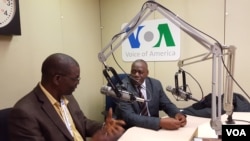A Burundian civil society leader has called on the international community to help strengthen Burundian civil society groups so that they can effectively play their role as the voices of the people. Deogratias Niyonkuru, secretary general of ADISCO, a Burundian NGO that organizes farmers to mobilize resources for their own development, said civil society has a major role to play in the ongoing efforts to find an amicable solution to the country’s crisis.
This comes as the international community has called for an all-inclusive dialogue between the government and the opposition.
Niyonkuru said participation by civil society groups is needed because too often peace talks are represented by the extreme views of the government and the opposition without the voices of the people.
“As you know, opposition and the government they are fighting for power. Civil society doesn’t fight for power; civil society doesn’t fight for power. Civil Society represents the people, represents the society and it is very, very important to hear a third voice. My feeling for the moment in Burundi is that we are hearing too much the voices of extremists, of the two parties and we really need a third party, a true civil society which can be really in the middle of the two parties, a party which is representing the interest of the population,” he said.
International community has a responsibility
Niyonkuru said while development-oriented civil society groups in Burundi have no problem right now, the case is not the same for civil society groups working on human rights and governance issues.
“A lot of them have fled the country. The positions that they took in the events in Burundi have made government to consider them as members of the opposition,” he said.
He said the international community can strengthen civil society to help play its requisite role in promoting development and advancing human rights.
“In times like this, the temptation is to stop financing civil society and it is important to advocate for support for civil society. The second point is to offer a legal context which can protect them. Civil society in questioning policies of government is not acting like the opposition. For instance in western countries like the United States the governments are paying their NGOs in order to contest what governments are doing, and that’s the way those countries can progress in development and in human rights,” Niyonkuru said.
Weary of fighting
Niyonkuru said Burundians are tired of the bloodshed and the insecurity and want an end to the crisis.
“Everybody wants an end to the crisis. People are tired of war, especially during the night they are in fear. They are afraid that if the situation goes on like this, there will be a lot of refugees who will need to go to other countries. And that’s why it is very important to do what has to be done to in order to help parties negotiate in order to tell them to listen to the interest of the country and not to listen to their own interest,” Niyonkuru said.
He said life in the Burundian capital, Bujumbura appears deceivingly calm during the day but a dangerous place during the night.
“In some quarters, I don’t know how they are living honestly because we can say that it is an urban guerrilla that is taking part in the country. There are selective assassinations. Today it can be me and tomorrow it can be you. So let’s say that we are surviving. It is God who is protecting everybody because it can be you and another day it can be another person,” Niyonkuru said.
Praise for the ADISCO
Niyonkuru won the 2015 King Baudouin African Development Prize for outstanding contributions in the development field in Africa. He said the prize is an important recognition of the work ADISCO is doing.
“This means that we have got a certain distinction among the development community in Africa and that the strategies we are using to promote development are considered to be very good and need to be known all over the world. The prize is helping us in order to promote values that we put ahead,” he said.
He said his organization helps farmers to mobilize their resources for their own development; improve production, storage, marketing and even processing; it also helps farmers get insurances and supports youth entrepreneurship to provide jobs for young people.
Niyonkuru said while there is optimism among a great majority of Burundi’s rural population, it does not mean that the anxiety of war is not hanging over them and he said this is having an impact on farmers. He said investing in long term projects is difficult because people don't know what is going to happen in the country.






